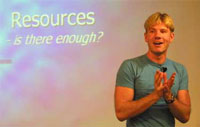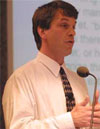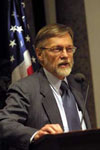Debating the Real State of the World: Are Dire Environmental Claims Backed by Sound Evidence?
Overview
Featuring Bjørn Lomborg, Associate Professor, University of Aarhus, Denmark;
David B. Sandalow, Executive Vice-President, World Wildlife Fund (discussant);
and D. James Baker, former Administrator, U.S. National Oceanic and Atmospheric Administration (discussant)
October 2, 2001—Could the world's environment actually be getting not worse but better?
 Bjørn Lomborg
Bjørn Lomborg
Bjørn Lomborg thinks so. His new book, The Skeptical Environmentalist: Measuring the Real State of the World, lit a firestorm of controversy when it was published last year in Europe. Lomborg visited the Wilson Center to present and defend the book (which has just been published in the United States). Discussants David Sandalow and James Baker criticized The Skeptical Environmentalist as largely sloppy, misleading, and full of fatal misinterpretations.
Lomborg, a former member of Greenpeace, said that The Skeptical Environmentalist came out of his effort to debunk the work of the late economist Julian Simon, who argued that most environmentalist concerns-from global warming to rapid population growth to scarcity of resources-are unsupported by scientific evidence. But to Lomborg's surprise, the results of his research and statistical analysis ratified most of Simon's positions. The Skeptical Environmentalist instead asserts that it is environmental advocacy groups who distort the state of the earth's health as a fund-raising technique, through what Lomborg terms "The Litany" of dire forecasts.
"Is This A Good Way To Spend Our Money?"
Lomborg argued that evidence clearly shows an environmental apocalypse is not at hand. Hunger, natural resource abundance, species extinction, life expectancy, pollution—by United Nations and other independent measurements, Lomborg said, all these categories have vastly improved and will continue to improve, both for the industrialized and for the developing world. While there are still environmental problems and resource imbalances, Lomborg said, these are fewer and smaller than ever before; and policymakers should be rationally prioritizing societal needs instead of acting out of desperation. "We can only use our money once," said Lomborg, "so we should make sure we spend it in the best possible way. Are we making the right decisions now, or are we just handing over our wallets?"
Lomborg then sketched out a few of his specific findings. The world's percentage of starving people has dropped from 35 percent in 1967 to 19 percent today, and is projected to drop to 6 percent by 2030. Crucial raw commodities such as oil have been decreasing in price because we are getting better at finding and exploiting them. Air pollution, by far the most injurious kind of environmental contaminant, is at its lowest point since 1585 in London. (Lomborg admitted that, while air pollution is getting worse in the developing world, it will get better as developing countries follow the economic growth patterns of the developed world.)
 The Skeptical Environmentalist particularly targets the Kyoto Protocol for criticism. While global warming certainly is occurring, Lomborg said, Kyoto's measures would postpone its effects only slightly, and at a cost of $150 billion to $350 billion a year. "For the cost of Kyoto for one year," said Lomborg, "we could be giving clean water and good sanitation to every single human being on the planet"—which, he maintained, would stop 200 million deaths and 500 million illnesses annually. "Is this a good way to spend our money?" he lamented.
The Skeptical Environmentalist particularly targets the Kyoto Protocol for criticism. While global warming certainly is occurring, Lomborg said, Kyoto's measures would postpone its effects only slightly, and at a cost of $150 billion to $350 billion a year. "For the cost of Kyoto for one year," said Lomborg, "we could be giving clean water and good sanitation to every single human being on the planet"—which, he maintained, would stop 200 million deaths and 500 million illnesses annually. "Is this a good way to spend our money?" he lamented.
Lomborg concluded by stating that spending on the environment is in fact a profoundly inefficient way to save lives. He cited a Harvard Center for Risk Analysis study that, while a life is saved for every $9,000 in health care spending, it takes $4.2 million in environmental spending to achieve comparable results. Lomborg added that U.S. environmental spending (currently at $21 billion) could save 60,000 more lives "for free" if spent optimally on something else. "In other words," he said, "our current priorities are committing 60,000 statistical murders every decade."
Sandalow: Book Understates Environmental Problems
 David Sandalow
David Sandalow
While agreeing that many global environmental and human security trends are getting better, David Sandalow said that he found The Skeptical Environmentalist "quite disappointing," full of obvious errors, sloppy sourcing, and chronic exaggeration of the positions of environmental advocacy groups and thinkers. "In the United States," Sandalow said, "there is a much more complex and less momentous view of environmental problems than that presented by Professor Lomborg." He said that the book was best understood as a provocative and ambitious polemic, and that readers should proceed with caution.
Sandalow went on to criticize Lomborg for underplaying significant environmental problems. For example, while The Skeptical Environmentalist concedes that global species extinction is now occurring at 1,500 times the natural background rate, Sandalow said that Lomborg characterized this phenomenon as "not a catastrophe, but a problem." "If we had a 1,500-time increase in rainfall, spread of disease, or unemployment," said Sandalow, "those would be considered pretty big problems." Sandalow also called Kyoto a "paradigmatic case of decision-making under uncertainty," and accused Lomborg of emphasizing the uncertainties about climate change over the certainties. "Kyoto alone was never intended as the solution," said Sandalow. "It was intended to set the world in the right direction, and to set the necessary advanced technology in motion. It's not an indictment of Kyoto that it alone fails to solve the problem."
Can Cost-Benefit Analysis Include Values?
James Baker called The Skeptical Environmentalist an impressive piece of work, and linked it to previous efforts to reprioritize environmental questions, such as Gregg Easterbrook's A Moment on the Earth. But although Lomborg's book is strong in factual information, Baker said, it is far weaker on analysis. Lomborg, Baker charged, does not have the background to interpret environmental data, and his failure to distinguish between peer-reviewed and non peer-reviewed material fatally compromises his argument.
 James Baker
James Baker
In fact, Baker said, Lomborg's data about an improving environment is common knowledge, and well-represented in government and policy debates-the Report of the President's Council on Sustainable Development makes many of the same points. The real question, Baker said, is how we are going to manage the earth's resources in a period of rapid change. Lomborg's mistake, Baker said, is to focus on global averages to the exclusion of regional and local realities—such as how sea-level rise associated with climate change will affect small island states, or how overfishing will impact those nations dependent on the sea for protein. Baker also criticized Lomborg for an overreliance on cost benefit analyses, saying that "values are critical in making decisions—you can't get them just from statistics." He cited MIT professor Robert Solow's inclusion of human and natural capital in GDP calculations as a better model than Lomborg's utilitarianism. "We don't make social judgements that accept losers just because it costs less," said Baker. A prime example of such a value-based judgement, Baker said, is the 1973 Endangered Species Act, which is now recognized as a basic expression of American values but which would fail conventional cost/benefit analysis.
Discussion focused on both the accuracy of Lomborg's data and his societal priorities. Lomborg reiterated both his optimism about the future and his call for clear world priorities. As an example, he said that those who have criticized intensive agriculture in India for contaminating water wells there with arsenic were missing how that agriculture had saved hundreds of millions from starvation. "The people who acted are those who believed in the future," Lomborg asserted, "who believed that technology probably could solve our problems."
Lomborg went on to defend his criticism of Kyoto, saying that he had based his cost-benefit analysis on the average predictions of six to twelve climate change models (including that of the Intergovernmental Panel on Climate Change). In response to a question about how global numbers mask a decline of some tree and bird species, Lomborg asked rhetorically if people really minded. "People want clearings in forests for play," he said. "Is it a worse forest, or better? And for whom?" He also defended cost/benefit analysis, saying that it is already (however unconsciously) the world's default method of evaluation. "We all feign that we feel bad about it, but it's a way of analyzing the status quo," Lomborg concluded.
"The Litany"
Bjørn Lomborg uses this phrase to refer to pessimistic predictions about the environment that he argues envrionmental groups use to generate attention and funding. On page 4 of The Skeptical Environmentalist, Lomborg summarizes "The Litany":
"We are all familiar with the Litany: the environment is in poor shape here on Earth. Our resources are running out. The population is ever growing, leaving less and less to eat. The air and the water are becoming ever more polluted. The planet's species are becoming extinct in vast numbers—we kill off more than 40,000 each year. The forests are disappearing, fish stocks are collapsing and the coral reefs are dying.
"We are defiling our Earth, the fertile topsoil is disappearing, we are paving over nature, destroying the wilderness, decimating the biosphere, and will end up killing ourselves in the process. The world's ecosystem is breaking down. We are fast approaching the absolute limit of viability, and the limits of growth are becoming apparent.
"We know the Litany and have heard it so often that yet another repetition is, well, almost reassuring. There is just one problem: it does not seem to be backed up by the available evidence."
Documents & Downloads
- Debating the Real State of the World: Are Dire Environmental Claims Backed by Sound Evidence?Download
- Debating the Real State of the World: Are Dire Environmental Claims Backed by Sound Evidence?Download
- Debating the Real State of the World: Are Dire Environmental Claims Backed by Sound Evidence?Download
Hosted By

Environmental Change and Security Program
The Environmental Change and Security Program (ECSP) explores the connections between environmental change, health, and population dynamics and their links to conflict, human insecurity, and foreign policy. Read more
Thank you for your interest in this event. Please send any feedback or questions to our Events staff.








